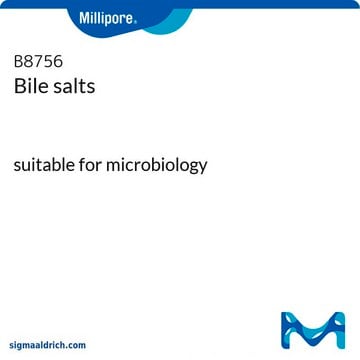207861
Carbonate d′ammomium
ACS reagent, ≥30.0% NH3 basis
Synonyme(s) :
sel Hartshorn
About This Item
Produits recommandés
Qualité
ACS reagent
Densité de vapeur
2.7 (vs air)
Description
Mixture of variable proportions of ammonium bicarbonate and ammonium carbamate
Forme
powder or chunks
Concentration
≥30.0% NH3
Impuretés
≤0.005% insolubles
≤0.01 nonvolatiles
Traces d'anions
chloride (Cl-): ≤5 ppm
sulfate (SO42-): ≤0.002%
Traces de cations
Fe: ≤5 ppm
heavy metals: ≤5 ppm (by ICP-OES)
Chaîne SMILES
N.N.OC(O)=O
InChI
1S/CH2O3.2H3N/c2-1(3)4;;/h(H2,2,3,4);2*1H3
Clé InChI
PRKQVKDSMLBJBJ-UHFFFAOYSA-N
Vous recherchez des produits similaires ? Visite Guide de comparaison des produits
Catégories apparentées
Description générale
Application
- Preparation of 3,4-dihydropyrimidin-2(1H)-one and 1,4-dihydropyridine derivatives, via Biginelli and Hantzsch reactions.
- Preparation of ammonium carbonate buffer.
- Synthesis of dihyropyridones derivatives.
Code de la classe de stockage
11 - Combustible Solids
Classe de danger pour l'eau (WGK)
WGK 1
Point d'éclair (°F)
Not applicable
Point d'éclair (°C)
Not applicable
Certificats d'analyse (COA)
Recherchez un Certificats d'analyse (COA) en saisissant le numéro de lot du produit. Les numéros de lot figurent sur l'étiquette du produit après les mots "Lot" ou "Batch".
Déjà en possession de ce produit ?
Retrouvez la documentation relative aux produits que vous avez récemment achetés dans la Bibliothèque de documents.
Notre équipe de scientifiques dispose d'une expérience dans tous les secteurs de la recherche, notamment en sciences de la vie, science des matériaux, synthèse chimique, chromatographie, analyse et dans de nombreux autres domaines..
Contacter notre Service technique





